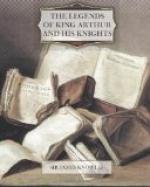Then the king bade Cador, Duke of Cornwall, follow Cheldric, the chief leader, and the remnant of his hosts, unto the uttermost. He, therefore, when he had first seized their fleet, and filled it with chosen men, to beat them back when they should fly to it at last, chased them and slew them without mercy so long as he could overtake them. And though they crept with trembling hearts for shelter to the coverts of the woods and dens of mountains, yet even so they found no safety, for Cador slew them, even one by one. Last of all he caught and slew Cheldric himself, and slaughtering a great multitude took hostages for the surrender of the rest.
Meanwhile, King Arthur turned from Badon Hill, and freed his nephew Hoel from the Scots and Picts, who besieged him in Alclud. And when he had defeated them in three sore battles, he drove them before him to a lake, which was one of the most wondrous lakes in all the world, for it was fed by sixty rivers, and had sixty islands, and sixty rocks, and on every island sixty eagles’ nests. But King Arthur with a great fleet sailed round the rivers and besieged them in the lake for fifteen days, so that many thousands died of hunger.
Anon the King of Ireland came with an army to relieve them; but Arthur, turning on him fiercely, routed him, and compelled him to retreat in terror to his land. Then he pursued his purpose, which was no less to destroy the race of Picts and Scots, who, beyond memory, had been a ceaseless torment to the Britons by their barbarous malice.
So bitterly, therefore, did he treat them, giving quarter to none, that at length the bishops of that miserable country with the clergy met together, and, bearing all the holy relics, came barefooted to the king to pray his mercy for their people. As soon as they were led before him they fell down upon their knees, and piteously besought him to spare the few survivors of their countrymen, and grant them any corner of the land where they might live in peace. When he thus heard them, and knew that he had now fully punished them, he consented to their prayer, and withdrew his hosts from any further slaughter.
Then turned he back to his own realm, and came to York for Christmas, and there with high solemnity observed that holy tide; and being passing grieved to see the ruin of the churches and houses, which the rage or the pagans had destroyed, he rebuilt them, and restored the city to its ancient happy state.
And on a certain day, as the king sat with his barons, there came into the court a squire on horseback, carrying a knight before him wounded to the death, and told the king that hard by in the forest was a knight who had reared up a pavilion by the fountain, “and hath slain my master, a valiant knight, whose name was Nirles; wherefore I beseech thee, Lord, my master may be buried, and that some good knight may avenge his death.”
At that stepped forth a squire named Griflet, who was very young, being of the same age with King Arthur, and besought the king, for all the service he had done, to give him knighthood.




